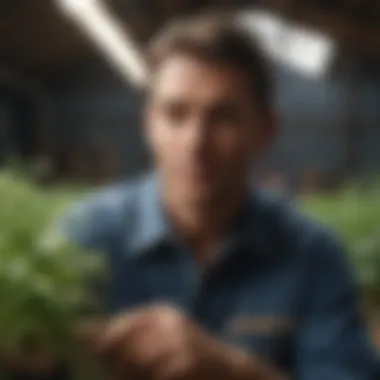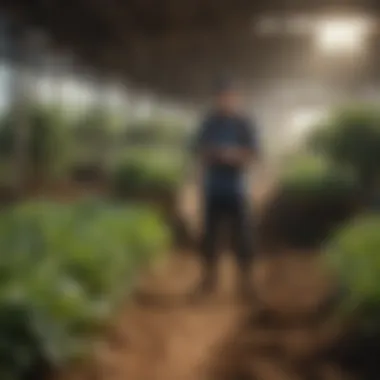Understanding Microempreendedor Individual in Agriculture


Intro
The concept of Microempreendedor Individual (MEI) is fundamental to small-scale agricultural entrepreneurship. This system allows individual farmers and small business owners to formalize their operations, providing numerous benefits aimed at fostering growth and sustainability. In this article, we will explore various aspects of MEI, particularly its implications in agriculture.
Understanding the MEI framework involves looking at its legal definitions, benefits, requirements, and how it positions farmers and agro-entrepreneurs for success in a competitive market. This exploration is especially pertinent as the agricultural sector is undergoing rapid changes driven by technology and sustainability demands. As such, farmers and enthusiasts must grasp the significance of MEI.
Let's delve deeper into research and data that illustrates MEI's impact and the trends shaping the agricultural landscape.
Preamble to Microempreendedor Individual
The Microempreendedor Individual (MEI) regime offers a unique and essential framework for small-scale entrepreneurs in Brazil, particularly in the agricultural sector. Understanding the MEI is crucial for anyone involved in farming or agricultural ventures. It presents an opportunity for individuals to formalize their businesses, gain access to resources, and contribute meaningfully to the economy. The MEI is not just a legal status; it represents a pathway towards sustainability and growth for agricultural entrepreneurs.
Definition of Microempreendedor Individual
The term "Microempreendedor Individual" refers to a simplified form of business registration available in Brazil. It is designed specifically for individual entrepreneurs who operate as sole proprietors. This classification allows them to formalize their activities with minimal bureaucratic hurdles. The MEI status is ideal for those whose annual revenue does not exceed R$81,000. It simplifies taxation, making it easier for small businesses to comply with legal obligations. By registering as an MEI, farmers can gain benefits such as the ability to issue invoices, access to credit, and eligibility for social security.
Historical Context and Evolution
The MEI program was officially launched in 2009 as a response to the high levels of informality in Brazil's job market. Many small-scale farmers operated without proper registration, missing out on critical benefits and protections. This initiative aimed to integrate these workers into the formal economy, promoting economic stability and growth.
Over the years, the MEI framework has evolved to accommodate various sectors, including agriculture. Government policies have shifted to enhance support for small-scale farmers, recognizing their vital role in Brazil’s food production and rural economy. Notably, in 2018, policies were updated to include more agricultural activities under the MEI umbrella, thereby expanding opportunities for farmers to register and access resources. This evolution reflects the importance of the agricultural sector in sustaining both local economies and national food security.
Legal Framework of MEI in Brazil
The legal framework for the Microempreendedor Individual (MEI) is fundamental to understanding its role within the agricultural sector in Brazil. This framework shapes farmers' and small entrepreneurs' operational landscape, providing a clear structure for their business activities. It encompasses laws, regulations, and guidelines that establish the rights and obligations of MEIs. By clarifying these points, the MEI legislation encourages the formalization of small agribusinesses, creating opportunities for growth and sustainability.
Understanding this framework allows agricultural entrepreneurs to navigate the complexities of starting and managing their businesses. Moreover, it can lead to numerous benefits that enhance productivity and promote sustainable practices in agriculture.
Governing Laws and Regulations
The governing laws for MEIs in Brazil are primarily established by the national policies aimed at economic inclusion and support for small businesses. The main legislation is Law No. 128/2006, which created the MEI category. This initiative allows small entrepreneurs to register formally while benefiting from reduced tax burdens and simplified bureaucratic processes.
Key regulations outline what activities qualify as MEI and specify financial thresholds. The allowed annual gross revenue for MEIs is set at R$ 81,000, ensuring that small-scale businesses can thrive without excessive taxation. Additionally, MEIs are permitted to employ up to one employee, facilitating business growth while keeping labor costs manageable.
These laws also include provisions for taxation under the Simples Nacional system, which simplifies tax calculations based on the business's revenue. Such regulations help to sustain the agricultural sector and encourage the adoption of best practices.
Eligibility Criteria for MEI Status
Eligibility for MEI status is critical for farmers and agricultural entrepreneurs considering formalization. The criteria are designed to support small businesses and include:
- Annual Revenue: The business must not exceed the gross income limit of R$ 81,000.
- Business Activities: The activities performed must align with the specific classifications established for MEIs, particularly those relevant to agriculture.
- Number of Employees: The business can employ only one worker, further emphasizing the small scale of MEIs.
- No Participation in Other Companies: The individual cannot be a partner or shareholder in another company.
Meeting these criteria is essential for applicants aiming to enjoy the benefits tied to the MEI status. Becoming an MEI opens avenues for access to credit, social security benefits, and simplified regulatory compliance, which are integral for fostering growth in the agricultural sector.
"The MEI framework not only facilitates formal business operations but also enhances the competitive edge of small agricultural enterprises in Brazil."
This succinct understanding of the legal framework and eligibility criteria provides farmers and agricultural entrepreneurs with insights necessary for leveraging MEI advantages effectively.
MEI Benefits for Farmers and Agricultural Entrepreneurs
The Microempreendedor Individual (MEI) framework has introduced multiple advantages for farmers and agricultural entrepreneurs in Brazil. These benefits significantly enhance their capacity to thrive in the competitive agricultural landscape. Awareness of these provisions is crucial for both aspiring and current agricultural microentrepreneurs.
Simplified Taxation Process


The taxation model for MEIs is designed to be simple: a fixed monthly tax that varies depending on the business activity. This predictability allows farmers to manage their finances effectively. For many, the ease of understanding the tax obligations is a breath of fresh air, compared to the complexity of traditional taxation systems.
The MEI can opt for a tax scheme that covers social contributions, income tax, and other duties, making it affordable. Farmers typically have to deal with fluctuating income due to seasonal changes, making a simplified tax approach vital. The small monthly fee can be easier to handle, enabling farmers to plan their expenses more accurately.
Access to Credit and Financial Services
Bank loans
Access to bank loans is another significant advantage for MEIs. Financial institutions recognize MEI status, allowing them to apply for agricultural loans tailored for small enterprises. These bank loans often come with lower interest rates compared to other types of credit. This feature makes them a beneficial choice for agricultural entrepreneurs looking for funding.
The application process for bank loans has also been streamlined for MEIs. Lenders typically require less documentation, making it easier for farmers to secure financing. Furthermore, having a formal business status increases legitimacy and trust with potential lenders.
However, one must be cautious, as loans can sometimes lead to debt if not managed properly. Therefore, understanding the terms and maintaining a clear repayment strategy is critical for success.
Government subsidies
Government subsidies further enhance the MEI experience in agriculture. These subsidies are designed to support small businesses, including those in agriculture, which can access financial aid or direct subsidies for projects. These funds can help farmers invest in better equipment or sustainable methods.
A standout feature of government subsidies is that they often come with conditions. For example, the funds may need to be used for specific agricultural practices or during certain times of the year. This stipulation can benefit the sector by encouraging sustainable practices and efficient resource management.
While these subsidies provide crucial support, it is important to understand potential bureaucratic requirements or application processes that can complicate access. Thus, staying informed about available programs and deadlines is essential.
Social Security Benefits
Social security benefits are vital in providing a safety net for farmers. MEIs can access benefits such as retirement plans, health insurance, and maternity leave. These social security options empower farmers, allowing them to focus on their work, knowing they have some security.
Focusing on the needs of agricultural professionals, social security for MEIs helps reduce the vulnerabilities associated with the agricultural sector. Accessing these benefits can support farmers during challenging times, such as illness or incapacity to work due to age or other factors.
In summary, the benefits associated with the MEI status for farmers and agricultural entrepreneurs are significant. With improved taxation, easier access to credit, government subsidies, and social security considerations, the MEI framework offers a pathway to stability and growth for individuals dedicated to agricultural pursuits.
Challenges Faced by Microempreendedores Individuais
Microempreendedores Individuais (MEIs) in the agricultural sector encounter numerous challenges that can impede their growth and sustainability. Identifying these challenges is crucial for understanding the overall landscape of small agricultural businesses. By addressing these issues, MEIs can develop strategies to overcome barriers and optimize their operations. This section examines the major hurdles faced by MEIs, focusing on administrative and bureaucratic complexities, market access limitations, and the financial instability that often affects this category of entrepreneurs.
Administrative and Bureaucratic Hurdles
One significant challenge for MEIs is navigating the intricate administrative and bureaucratic systems in Brazil. Many small agricultural entrepreneurs lack access to information related to regulations, permits, and compliance requirements.
The registration process can be confusing, often leading to delays that may hinder business operations. Moreover, paperwork can be tedious, and missing deadlines can result in fines or loss of license.
These hurdles can create a barrier for individuals who may have innovative ideas but do not possess expertise in dealing with bureaucracy. To improve this situation, initiatives that simplify processes, such as online registration platforms, must be promoted. Equipping MEIs with better knowledge on regulatory compliance can also alleviate some of these challenges.
Limited Access to Markets
Limited access to markets poses another major challenge for MEIs. Many small agricultural producers find it difficult to connect with larger distributors or retailers. The integration into established supply chains often remains elusive.
Market limitations contribute to reduced income and low confidence in business growth. Additionally, competition from larger agricultural enterprises makes it hard for MEIs to showcase their products due to insufficient marketing resources.
Encouraging collaboration among MEIs can foster cooperatives or associations, enhancing their market accessibility and bargaining power. Local initiatives like farmers’ markets and community-supported agriculture could also provide alternative pathways for MEIs to reach consumers directly.
Income Variability and Financial Instability
Financial instability is a persistent issue faced by many MEIs. Agricultural businesses are especially vulnerable to external factors such as weather patterns and market fluctuations. This volatility leads to income variability, making it difficult for these entrepreneurs to plan their finances effectively.


Without a stable income, MEIs struggle to invest back into their businesses, stunting growth potential. This financial uncertainty may discourage new entrants into the agricultural sector.
Understanding financial management is essential for MEIs. Workshops or training sessions focused on budgeting and savings techniques might empower these entrepreneurs to handle what is often unpredictable financial terrain. Additionally, access to affordable insurance and credit options could provide safety nets for dealing with unexpected challenges.
"Addressing the challenges faced by MEIs is not just a matter of improving individual businesses. It is essential for the sustainability of local economies and food systems."
The Role of MEIs in Sustainable Agricultural Practices
Microempreendedores Individuais (MEIs) play a significant role in promoting sustainable agricultural practices. Their existence not only uplifts individuals financially but also has a collective impact on the environment, community health, and economic resilience. Through their small-scale operations, MEIs often embrace methods that prioritize ecological balance, which is particularly important in today’s agricultural landscape.
Promoting Organic Farming Techniques
MEIs are increasingly adopting organic farming techniques. This method is crucial as it avoids synthetic fertilizers and pesticides, which can harm the environment. Organic practices often include crop rotation, intercropping, and the use of organic compost. This approach enhances soil health and biodiversity, supporting a more sustainable ecosystem.
Farmers who pursue organic certification can access niche markets, where consumers are willing to pay a premium for sustainably grown produce. This creates an economic incentive for MEIs to adopt environmentally friendly practices. Furthermore, by reducing dependency on chemical inputs, MEIs can improve the long-term viability of their farms.
Key benefits of promoting organic farming include:
- Increased soil fertility
- Reduced environmental pollution
- Enhanced food safety for consumers
The integration of organic farming techniques also encourages knowledge sharing among farmers, promoting community growth and collaboration in sustainable practices.
Contributing to Local Food Systems
MEIs contribute significantly to local food systems by ensuring access to fresh and nutritious foods. They often sell directly to consumers through farmer's markets or community-supported agriculture (CSA) programs. This direct-to-consumer model shortens supply chains, reducing transportation emissions and fostering community ties.
By focusing on local production, MEIs also support local economies. They provide jobs, stimulate economic activity, and enhance food sovereignty by reducing reliance on large agricultural corporations. As a result, local communities benefit from a more resilient food system that can respond more effectively to disruptions.
Some aspects of their contribution to local food systems are:
- Improved food accessibility and affordability
- Reinforcement of community solidarity
- Promotion of cultural and culinary diversity
"Sustainable practices are not only a necessity for the environment but also an opportunity for economic growth within local communities."
Their impact will likely grow as more farmers recognize the importance of sustainable approaches in overcoming global challenges.
Case Studies of Successful Microempreendedores Individuais
Examining case studies within the realm of Microempreendedor Individual (MEI) is crucial for grasping both the impact and potential of this entrepreneurial framework. These cases illuminate the diverse paths taken by individuals who have embraced the MEI model within agriculture. This section showcases innovative agricultural entrepreneurs who have leveraged their MEI status to enhance productivity and foster sustainable practices.
Profiles of Innovative Agricultural Entrepreneurs
One remarkable example is Maria, an organic farmer from Goiás. Maria transformed her family’s small plot into a thriving organic vegetable farm. By registering as an MEI, she gained access to credit that was previously unattainable. Moreover, her ability to formalize her enterprise allowed her to tap into local markets, establishing a growing customer base. Her success underscores the benefits of MEI registration, particularly in terms of financial support and increased market visibility.
Another inspiring profile is of João, who specializes in aquaponics in São Paulo. João utilized his MEI status to import specialized equipment, which contributed to the efficiency and sustainability of his farm. This innovation not only improved his output but also minimized environmental impact. Both Maria and João demonstrate how ingenious approaches, coupled with MEI support, can lead to significant advancements in agricultural practices, as well as economic stability.
Lessons Learned from Their Experiences
Several key insights emerge from the journeys of these microempreendedores.
- Resourcefulness is key: Both entrepreneurs capitalized on their local resources and adapted traditional practices.
- Networking enhances opportunities: Building relationships with local buyers and other farmers proved invaluable. They could share knowledge and insights that led to further success.
- Formal registration opens doors: Their MEI status streamlined processes for loans, subsidies, and technical assistance.
"Registration as an MEI was not just paperwork; it was a passport to new opportunities and a more resilient business model."


These examples highlight the broader implications for the agricultural sector. Embracing the MEI framework enhances the entrepreneurial identity and presents a concrete pathway toward achieving sustainable and profitable farming.
How to Become a Microempreendedor Individual
Becoming a Microempreendedor Individual (MEI) is crucial for agricultural entrepreneurs looking to enhance their business opportunities. This framework offers a simplified approach for individuals who want to formalize their operations. By registering as an MEI, farmers gain access to important benefits including tax advantages, credit lines, and social protections. However, understanding how to navigate the registration process and comply with ongoing obligations can be overwhelming for new entrants to the agricultural market.
Step-by-Step Registration Process
The registration of an MEI is a relatively straightforward process designed to encourage individuals to formalize their business activities. Below are the key steps:
- Check Eligibility: Ensure that your activity is eligible under the MEI classification. You should not have sales that exceed the set limit established by the government.
- Gather Necessary Documents: Collect essential personal documents. This typically includes your CPF (Cadastro de Pessoas Físicas), identification document, and proof of residence.
- Access the Official MEI Portal: Visit the official MEI registration portal provided by the Brazilian government. This site allows you to fill out the application online without the need for an intermediary.
- Complete the Online Form: Fill in the required information carefully. Common details include your business name, address, and chosen activity.
- Review and Submit Application: Double-check the information for accuracy. Once verified, submit the application.
- Receive Your Registration Certificate: Upon approval, you will receive a certificate of MEI status, which you should keep on file for future reference.
"The simplicity of the MEI registration process encourages entrepreneurs to take the first step towards formalizing their business."
Having this certificate enables you to operate legally within the agricultural sector, which is crucial for building credibility among customers and partners.
Maintaining Compliance and Good Standing
Once registered as an MEI, compliance becomes essential to maintaining your status. Here are several key aspects to consider:
- Annual Revenue Limit: Remain aware of the revenue cap set by the government. Exceeding this limit can lead to losing MEI status.
- Monthly Tax Payments: As an MEI, you are required to pay a fixed monthly tax that covers social security and other contributions. It is vital to keep these payments current to avoid penalties.
- Provide Accurate Reporting: You must file an annual declaration detailing your income. Failure to do this can result in fines or the suspension of MEI status.
- Stay Informed on Regulatory Changes: Regulations regarding MEIs can change. Staying updated on any legislative alterations is important to remain compliant.
Keeping your MEI status in good standing not only safeguards your business but also opens the doors to various benefits exclusive to registered micro-entrepreneurs. This includes easier access to credit, support from government programs, and enhanced market opportunities.
Future Prospects for MEIs in Agriculture
The future of Microempreendedor Individual (MEI) in the agricultural sector is closely linked to emerging trends and policies that influence the landscape of this vital industry. As the world evolves, so do the needs and challenges faced by agricultural entrepreneurs. This section will explore potential policy changes and innovations in agricultural technology that may shape the future for MEIs.
Potential Policy Changes
In recent years, Brazilian government has recognized the importance of supporting small-scale farmers through a stable legal framework for MEIs. Policy changes are expected to play a critical role in expanding the capabilities and reach of microentrepreneurs in agriculture. These changes may include:
- Increased Financial Aid: Access to subsidies and grants could become more prevalent, allowing MEIs to invest in their businesses. This support could potentially cover operational costs or fund expansion projects.
- Streamlined Regulations: Simplifying the registration and compliance processes could encourage more rural workers to formalize their businesses. This could significantly reduce the bureaucratic barriers currently hindering many would-be MEIs.
"Empowering microentrepreneurs through policy reform can lead to greater economic stability and productivity in agriculture."
- Training and Development Programs: As agricultural practices evolve, it is essential that policies support educational initiatives for MEIs. These could focus on sustainable farming practices, business management, and technological advancements.
The evolution of policy frameworks will affect how MEIs operate and their ability to contribute meaningfully to the agricultural sector.
Innovations in Agricultural Technology
The advancements in agricultural technology signify another promising direction for MEIs. These innovations can enhance productivity, reduce costs, and help address sustainability concerns. Some key components include:
- Precision Agriculture: This approach uses data analysis and technology to optimize farming practices. Tools like GPS-guided equipment and drones can help MEIs make informed decisions about planting, irrigation, and harvesting.
- Biotechnology: Genetic advancements can lead to the development of more resilient crops. MEIs who adopt these innovations may enjoy improved yields and less susceptibility to diseases.
- Mobile Apps and Digital Platforms: The rise of tech-based solutions allows farmers to access market information, financial services, and agricultural advice right on their smartphones. As these technologies become more accessible, MEIs can leverage them to enhance their businesses.
- Sustainable Practices: Innovations focused on sustainability may also attract more consumers who value eco-friendly products. MEIs who embrace these techniques can tap into new, profitable markets and bolster their reputation.
Culmination
The conclusion serves an essential role in reinforcing the significance of Microempreendedor Individual (MEI) in agriculture. It encapsulates the core ideas discussed in the article, emphasizing how the MEI framework can empower individuals working within the agricultural sector. The notion of microentrepreneurship is increasingly relevant as agriculture faces both economic and environmental challenges.
Summary of Key Points
In the previous sections, we have explored various aspects of the MEI model:
- Definition and Historical Context: Understanding the basic framework and how it has evolved over the years, especially in relation to agriculture.
- Legal Framework: A detailed look at the laws and eligibility criteria that govern MEIs in Brazil, providing necessary guidelines for aspiring entrepreneurs.
- Benefits: Highlighting the advantages, including simplified taxation, access to credit, and social security benefits, which facilitate the growth of agricultural ventures.
- Challenges: Awareness of the hurdles, such as administrative complexities and limited market access, which can impede success and growth.
- Sustainability: Examining how MEIs contribute to organic farming and local food systems, showcasing their role in promoting sustainable practices.
- Success Stories: Presenting case studies of successful MEIs which provide practical insights and inspire future entrepreneurs.
- Future Prospects: Analyzing potential policy changes and innovations in agricultural technology that can impact the MEI landscape.
By summarizing these points, we can appreciate the multidimensional impact of MEIs on agriculture.
Final Thoughts on the Importance of MEI
The importance of Microempreendedor Individual cannot be overstated. It provides a structured pathway for individuals in the agricultural sector to formalize their businesses. With the MEI status, farmers and agricultural entrepreneurs can unlock various resources unavailable to informal enterprises. This support encourages innovation, economic stability, and community growth. Moreover, as the focus on sustainable agricultural practices becomes more imperative, MEIs are uniquely positioned to lead this shift. They play a vital role in mobilizing local economies, improving food security, and promoting environmental sustainability. Embracing the MEI framework offers not just personal benefits but contributes continually to the agricultural landscape.















